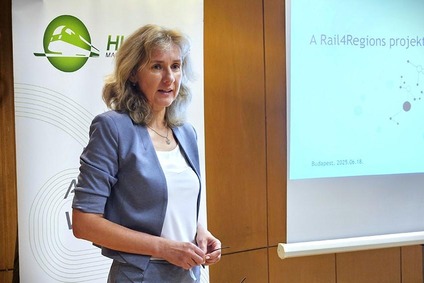
Kornélia Polcz, Head of Corporate Development department at our company, was also invited to the forum, where she shared her experience gained during the Rail4Regions (R4R) project with the participants. The three-year EU-funded scientific project focuses on improving the accessibility of major transport corridors, promoting regional development and supporting green transport in rural and peripheral regions. Of the eleven members coming from eight different countries, RCH from Hungary is the only railway company, that provides practical experience to the project.
Four separate working groups were established for the four main areas examined by the R4R project: loading areas, industrial sidings, branch lines, and single wagonload transport. In connection with the topic of the HUNGRAIL forum, our corporate development manager gave participants a clear and comprehensive overview of the situation of industrial sidings at international level, as well as the state subsidies available in certain countries – the Netherlands, Germany, the Czech Republic, Slovakia, Italy and Austria. She emphasized that in several European countries (e.g., Slovenia, the Czech Republic, and Slovakia), the background of industrial sidings is similar to that in Hungary, but there are numerous forms of different yet effective state aid schemes in place. In the Czech Republic and Slovakia, for example, state aids are available to cover nearly 50% of the costs of industrial railway investments, while in Italy, up to 100% of the costs of electrifying industrial sidings can be reimbursed. She added that it is important to examine these international examples carefully, as there are many ways to maintain or further increase traffic.
At another meeting of the single wagonload transport working group held by HUNGRAIL that afternoon, Kornélia Polcz presented the results and experiences of the single wagonload working group coordinated by Rail Cargo Hungaria as part of the R4R project, as well as its proposed solutions for ensuring the sustainability of this mode of transport.
